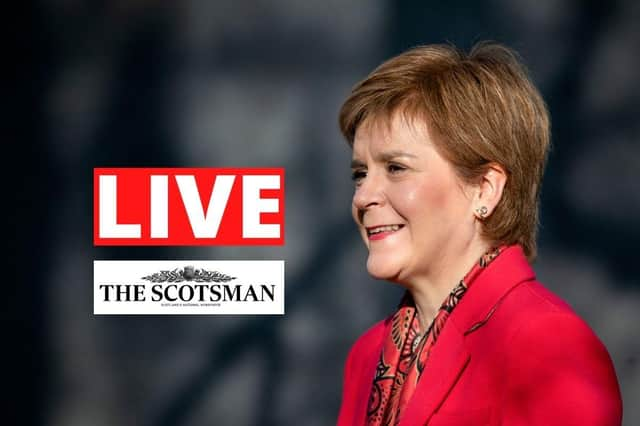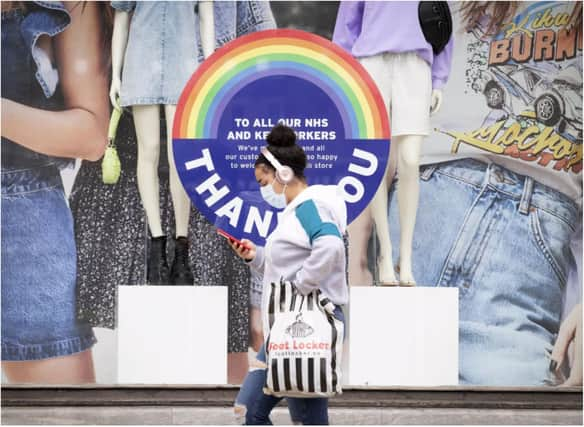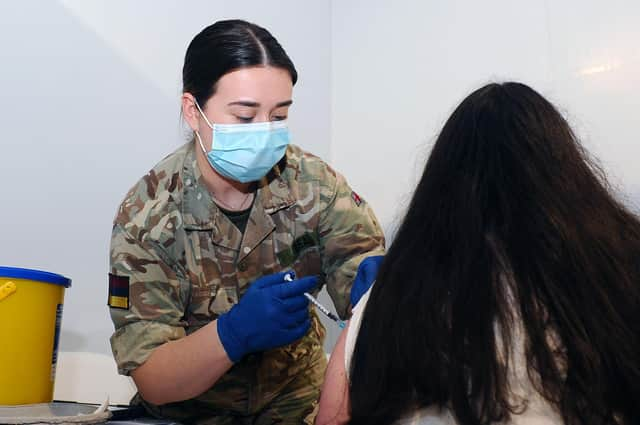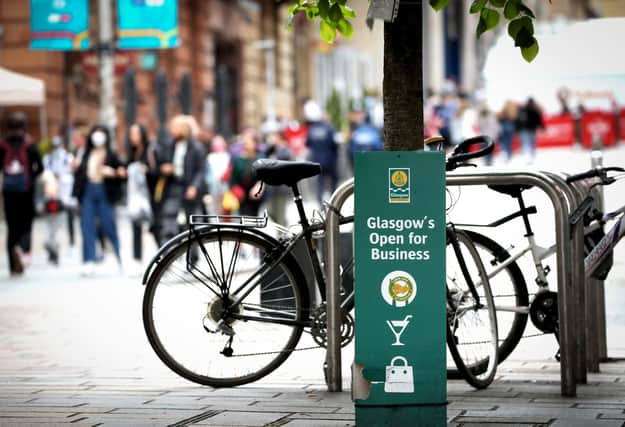Scotland Level 1 announcement RECAP: Nicola Sturgeon announces Glasgow lockdown rules change | Edinburgh remains in Level 2 | Full list of areas by level | What does Level 1 mean | Third wave concerns | FM statement in full


Scroll down to see how coverage of Nicola Sturgeon’s coronavirus levels update unfolded.
Coronavirus in Scotland RECAP: The latest updates on Tuesday, June 1
Key Events
- Glasgow will move down to Level 2
- Scotland records no covid deaths and 478 cases on Tuesday
- Majority of Central belt will remain in Level 2 restrictions
- Share Covid jabs with poorer nations, world leaders urged
The Scotsman’s top stories on Nicola Sturgeon’s announcement


Sturgeon to confirm if further easing of Covid restrictions can take place
Nicola Sturgeon will confirm “whether and to what extent” plans to further ease coronavirus restrictions can take place next week .
Under the Scottish Government’s Covid route map, Scotland was scheduled to move into Level 1 restrictions from June 7.
But a recent spike in infections has forced ministers to keep the entire Glasgow City Council area under Level 3 restrictions – meaning bars and restaurants can not serve alcohol indoors and get-togethers inside people’s homes are also barred.
Ms Sturgeon has already warned that Glasgow may “have to be in Level 2 for a couple of weeks before it moves to Level 1”.
She is due to reveal if the move to Level 1 can go ahead in a statement to MSPs at Holyrood on Tuesday afternoon.
Sturgeon: Vaccination success allows us to manage pandemic ‘less restrictively’
oronavirus vaccines should allow Scotland to manage the pandemic “less restrictively”, Nicola Sturgeon has said.
The First Minister praised an article by public health professor Devi Sridhar, who argued that people in Britain could see the end of the pandemic “within months, if not weeks” because of the vaccine rollout progress.
Posting on Twitter, Ms Sturgeon said she hoped Scotland was in a “transition” out of lockdown, with the impact of the vaccination programme providing “an ability to manage Covid differently and less restrictively”.
Writing in the Guardian, Professor Sridhar argued that throughout history “pandemics have ended when the disease ceases to dominate daily life and retreats into the background” and citizens of richer countries such as the UK and the US could experience this soon.
But she stressed that poorer countries who may struggle to afford vaccines, technology or treatments for Covid-19 “will remain trapped by outbreaks that cause chaos in hospitals and kill health workers and vulnerable and elderly people”.
Professor Sridhar, who is chair of global public health at the University of Edinburgh, added: “It’s now incumbent on richer countries that are emerging from the pandemic to turn their attention to poorer nations and ensure they have the resources they urgently require.
“It’s only when Covid-19 stops disrupting lives and livelihoods in all regions that we’ll truly be able to say the pandemic has ended.”
Share Covid jabs with poorer nations to end variants threat, world leaders urged
Covid vaccines must be shared with poorer nations to prevent richer countries being hit by newly-imported deadly variants, world leaders have been told.
Global bodies – along with MPs and peers – warned of fresh lockdowns if people in developing nations do not get a huge increase in jabs.
The warnings came as calls grew from experts to postpone England’s unlocking on June 21 due to fears the Indian variant is fuelling a third wave of potentially “explosive” Covid-19 infections.
In Scotland, First Minister Nicola Sturgeon will confirm “whether and to what extent” plans to further ease coronavirus restrictions can take place on June 7, amid extra controls in Glasgow to deal with rising cases.
With vaccines seen as the main escape route from repeated lockdowns to control the pandemic, governments around the world are being urged to do more to ensure those in developing nations can access jabs.
The heads of the World Health Organisation, International Monetary Fund, World Bank Group and World Trade Organisation warned of a “dangerous gap” in the availability of jabs, with low-income nations receiving “less than 1% of vaccines administered so far”.


Nicola Sturgeon is to announce on Tuesday whether Covid restrictions can be eased further – here's all we know
Nicola Sturgeon is to announce on Tuesday (June 1) whether Covid restrictions can be eased further in Scotland – with the First Minister previously indicating not all of the country may move to Level 1.
PM urged to adopt ‘one in, one out’ policy to boost jabs for developing world
More than 100 cross-party MPs and peers have urged Boris Johnson to show “global leadership” in the run-up to the G7 summit by pledging to do more to vaccinate developing nations.
With the Prime Minister chairing a gathering of the most economically powerful countries in the world in Cornwall from June 11, politicians are calling on him to commit to a one in, one out policy when it comes to vaccines.
For every dose bought for use in Britain, the signatories want the UK Government to donate a dose to the United Nations-backed Covax scheme, which is providing vaccines to low and middle-income countries.
It comes as the World Health Organisation, the International Monetary Fund, World Bank Group and the World Trade Organisation used a joint plea across a range of international newspapers to call for richer countries to give more Covid vaccines to poor nations or risk new variants bringing fresh lockdowns.
In a letter backed by senior Tory MPs Peter Bottomley and Dr Dan Poulter, a former health minister who has worked on the frontline during the pandemic, the signatories said there is “clear moral imperative to act to close the global vaccine divide”, as well as a “rational case…to stop the threat of variants emerging abroad and taking root in the UK”.
Others putting their name to the letter include former shadow chancellor John McDonnell, former archbishop of Canterbury Lord Carey, former Green Party leader Caroline Lucas, Margaret Thatcher’s former health minister Baroness Hooper and ex-leader of the Liberal Democrats Lord Campbell.
Ross says Scotland should move to Level 1 on June 7
Scottish Conservative leader Douglas Ross has insisted Scotland should be able to move to Level 1 on June 7, as he called on the Scottish Government not to leave whole areas behind if restrictions are relaxed.
Mr Ross said: “The success of Scotland and the UK’s vaccine scheme means we can now be far more positive about easing restrictions.”
The Tory added: “Everyone understands that there will be a need for local, targeted measures when an outbreak occurs.
“But leaving behind whole areas should be ruled out. Sweeping measures that unnecessarily hurt a whole city or council area are unfair on businesses and local people waiting to get on with their lives.”
Mr Ross argued: “Selectively imposing restrictions and targeting resources at smaller areas is entirely possible. The blanket council-wide approach is not the only plausible option.
“The one-size-fits-all approach should be replaced by targeted interventions to tackle local outbreaks.
“For the sake of jobs, businesses and people’s mental health, the country has to move forward together as much as possible.”


Army set to be deployed in Scotland to accelerate vaccinination rollout
The military is being called in to help accelerate the vaccine rollout in the Lothians amid claims staff shortages have left it in a “critical position”.
Ross Kemp launches campaign to thank volunteers for helping during the pandemic
Ross Kemp has launched the Cheers for Volunteers campaign to thank those who have worked for free to provide assistance during the pandemic.
The actor and television presenter has partnered with the Together Coalition and Royal Voluntary Service charities to honour volunteers.
As part of the campaign he has met volunteers at The Volunteer pub in central London to thank them for their efforts.
Kemp, 56, said: “What a fantastic bunch of people. It was a pleasure to take them out for a drink and I was honoured to kick off Cheers for Volunteers.
“Wherever you will be at 5pm on July 4 please join me in raising your drink of choice to all of the volunteers who have seen us through the pandemic.
“The last year has been hard for all of us, but we also saw it bringing our communities closer together.
“Whatever happens next in the pandemic we’re going to need to keep that community spirit going.”
The Cheers for Volunteers campaign is part of the National Thank You Day on July 4, which is designed to thank people for their work during the pandemic.
At 5pm on July 4 the public are being urged to join in raising a drink of their choice for volunteers.


'Disproportionate’ Glasgow Covid lockdown restrictions are ‘unfair and unlawful’, says law professor
‘Disproportionate’ lockdown restrictions in Glasgow are ‘unfair and unlawful’, a legal academic has warned.